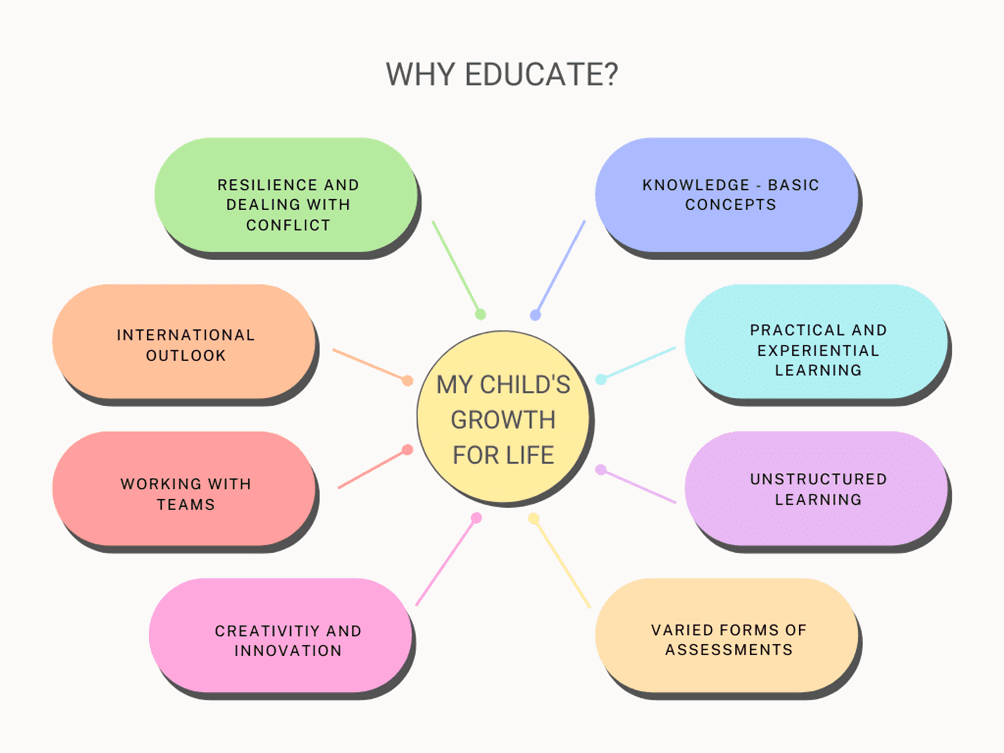Millennial Parents – How do you evaluate your child’s school?
Millennial Parents – How do you evaluate your child’s school?
Dear NCFE Community
"What makes a child gifted and talented may not always be good grades in school, but a different way of looking at the world and learning." —Chuck Grassley

Millennial parents comprise about 440 million in India – the largest military cohort on the planet.
68% of millennials identify having access to a quality education as one of the most important factors to ensure someone can succeed. Such parents look out for quality education and holistic development of their child as depicted in the above picture.
Quality education depends on two factors – the effort one (the student) puts in and the financial resources of parents.
The most important factors to quality education are:
· A positive and safe school culture
· Teacher’s quality – flexibility and creativity
91% of millennial teachers think it is more difficult to be a teacher today than twenty or thirty years ago.
As we reflect on the needs and concerns of both parents and teachers, it is crucial to look out for schools that have got the balance right.
Look out for schools with these attributes:
1. Schools with best-in-class facilities to maximise creative learning opportunities for students.
a. Is there a well-stocked library where students can check out books and do research? Are reading materials available in other languages?
b. Is time provided in the day for students to go to the library?
c. Do students have access to computers and to the Internet in the classroom and library?
d. Is use of the Internet monitored?
e. Is there an auditorium or a large room for school assemblies?
f. Is a school nurse on duty daily?
g. Are counseling services available to students?
h. Is the school accessible to children with mobility limitations?
i. Is the school safe?
j. How does the school prevent and handle violence, bullying, harassment, and other forms of abusive behavior?
k. What measures does the school take to ensure safety? What security measures are in place?
l. What is the school's relationship with the local police?
m. Is there a police officer on duty during school hours and for extracurricular activities?
n. Does the school have an emergency plan for local and national emergencies?
o. Are there drills?
2. Schools that support students to achieve the best results possible in their academic journey.
a. How do the school's test scores compare to those of other schools? (Check the school's report card if it is a public school or ask for information from the school if it is a private school.)
b. In the past few years, have test scores risen or declined?
c. How does the school explain the rise or decline? How well have children similar to yours performed on these tests?
d. How do students moving on to the next level of schooling perform in their new schools?
e. How many students leave the school before completing the last grade?
f. What special achievements or recognition has the school received?
3. Schools that support students, parents, employees and communities in their physical, emotional and mental wellbeing.
a. How does the school encourage parental involvement?
b. What are the ways parents can get involved?
c. Are parents encouraged to volunteer?
d. Does the school have an active parent- teacher organization?
e. Does the school hold meetings and events at times when parents can attend?
f. Are families expected to be involved with homework?
g. How frequently does the school communicate with parents?
h. Are community leaders involved with the school?
i. Does the school partner with local businesses and organizations?
j. Does the school work actively with professional development of teachers?
k. Does the school have engagement programmes for parents?
l. Does the school conduct awareness programmes for parents and students?
m. What does the school do to keep good teachers and improve teacher performance?
4. Schools with world-class academic learning and extra- curricular programmes.
a. Does the school have a particular approach to teaching and learning (e.g., group projects, individual performance, frequent testing)?
b. If yes, do you think your child will enjoy and learn from this approach?
c. Does the school do all it can to make sure each child learns? Does it provide opportunities for children to get extra help when they need it?
d. Is the school staff able to communicate in the language that your child understands?
e. Are children with limited English language skills, learning disabilities, or other special needs learning and performing well on tests?
f. What is the homework policy? Does it match your expectations for how much homework your child should do?
g. How large are the classes?
h. Does the school have a strong program of core academic subjects such as English, history, mathematics, science, arts, and foreign languages?
i. What competitive examinations does the school offer?
j. What evidence is there that the school is effectively teaching students to read?
k. Does the school provide enrichment opportunities for all students? For gifted students?
l. Does the school have extracurricular activities that support what is taught?
m. Is there an effective English language acquisition program for children who need it?
n. If your child has special learning needs, does the school have a curriculum and the necessary supports to appropriately accommodate those needs?
o. What extracurricular activities does the school offer after school or on weekends?
p. Do all students have the opportunity to participate in extracurricular activities?
q. What interscholastic activities are available to students?
5. Schools with a strong positive culture and reputation in the society.
a. How is the school regarded in the community?
b. How is the school viewed by other parents?
c. Is the school respected by other schools, particularly those that receive its students (when they move to the next level)?
d. Has the school won any awards?
e. Do people move to the community to go to the school?
f. What do the graduates of the school say?
g. Have graduates from the school made significant contributions to the community and their field of choice?
h. Do the students have school spirit?
i. Do students feel safe and secure at the school?
j. Do teachers have high expectations for all students to achieve to high academic standards?
k. Do teachers share the course content and objectives with parents?
l. When and how frequently are teachers available for parent conferences?
m. Do teachers assign homework? Is it rigorous? Frequent? Sufficient?
n. Are the teachers highly qualified to teach in their subject areas (do they know the subjects they are teaching)?
o. Do teachers have the skills and knowledge to address students with special learning needs?
p. Are specialized staffs available to address the special learning needs of a child (e.g., speech therapist, psychologist or aides)?
q. Do the teachers know the individual students in their classes?
r. Are teachers willing to provide extra help to students?
s. What is the school's policy regarding teacher response to parent inquiries?
t. What is the principal's philosophy about education?
u. What is the principal's attitude toward discipline?
v. What is the principal's reputation in the community?
w. Is the principal usually at the school and available to talk to parents?
x. How does the principal respond to parental concerns/complaints?
y. Is the school orderly and neat?
z. How does the school communicate with students and parents (weekly/monthly newsletter, e-mail, Web site)?
aa. Do the students appear to be courteous, happy, and disciplined?
bb. Is there a welcoming attitude toward all parents?
cc. How are the students with diverse learning needs (e.g., students with disabilities and students with limited English proficiency) treated?
dd. Do the teachers appear to be helpful and friendly?
Striking the right balance with the above embedded deep into the system of a school, NCFE has come a long way in working out the right balance to help a child succeed and be educated for life.
Serving You
Ms. Sunalini Benjamin
Chief Operating Officer
NCFE
